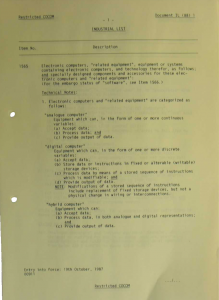I took part in the Undergraduate Research Scholarship at the end of my first year of study under the guidance of Dr Armin Grünbacher on his project ‘CoCom and the economics of the 2nd Cold War.’ I was tasked with searching through the online archives of The Economist and The Financial Times to produce summaries of articles concerning the Coordinating Committee for Multilateral Export Controls (CoCom). The research concerned how Western countries enforced and disagreed over exports embargoes of countries, and in particular Comecon countries. The CoCom acted both as a means to negotiate and enforce such embargoes, which consisted of any goods that had the potential for military use, such as computers.

In the build up to starting work, I designed the Excel spreadsheet for the project which was where summaries of the articles would be written before getting it approved by Dr Grünbacher. In addition to this, I also tested a few features on Excel to see if I could improve the spreadsheet, which allowed me to hyperlink the listed PDFs, which would improve the efficiency of the spreadsheet for Dr Grünbacher. I also ensured I had carried out some preliminary reading on the CoCom and after speaking with Dr Grünbacher, I took Førland’s Cold Economic Warfare from the library which provided a better background, rationale and understanding of how the CoCom operated. This would help me try to hit the ground running once I began the project.
I began the project not long afterwards, and as I got used to the project, I got faster at both reading through and summarising the articles, as well as improving my ability to filter out what I considered irreverent and not useful for Dr Grünbacher. An important aspect of carrying out the work was keeping in touch with Dr Grünbacher so I was able to relay to him how far along I was and how much longer the current task would take. This was significant as we quickly discovered that while The Economist was quite quick to get through, The Financial Times had far more material and was time consuming. This allowed for us to amend what the overall goals of the project were, and by getting through both on time, I was able to cover two further areas relating to loans from British banks to the USSR and a scandal involving West German companies aiding the development of a Libyan chemical plant.
Overall, I was extremely proud of what I had achieved in terms of the spreadsheet for Dr Grünbacher as well as the skills I gained and improved on during the project. The research provided both a great insight into how academic research is conducted as well as a new area of history and politics I had yet to study prior to taking on the scholarship. I would take this opportunity once more were I fortunate enough to be able to and feel far more ready and prepared to start my second year at the university.
Samuel Taylor, BA History
